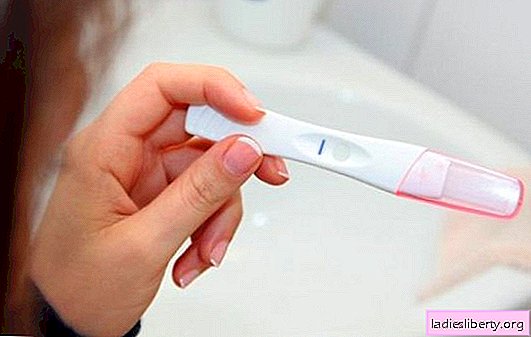
There can be many reasons for the delay of menstruation in the absence of pregnancy.
The menstrual cycle is the most important indicator of a woman's reproductive organs. It is a two-phase process.
1. In the first phase (follicular) on one of the paired genital glands (ovaries), a follicle grows containing a reproductive cell (egg). In the same period, a special layer, the endometrium, grows in the uterine cavity. It is needed so that in the event of possible fertilization, an embryo is implanted to it. The peak of the first phase is ovulation - the follicle bursts, the egg enters the fallopian tube and prepares for fertilization. The entire process described above normally lasts from 7 to 21 days (usually 14 days). This phase is controlled by female sex hormones - estrogens.
2. In the second phase (luteal) a yellow body forms from a bursted follicle - this is a specific structure that produces the hormone progesterone. It is needed to maintain the endometrium. The second phase normally lasts from 12 to 16 days (usually 14 days). If pregnancy does not occur, the corpus luteum ceases to function, the endometrium exfoliates from the uterine cavity and exits with a small amount of blood through the external genitalia. This process is called menstruation.
The menstrual cycle must be counted from the first day of menstruation to the first day of the next menstruation. Normally, it should be 21-35 days. Also, the cycle should ideally go like a clock. Doctors obstetrician-gynecologists make an error of 2-3 days in both directions. The absence of menstruation for 6 months or more is called amenorrhea. Normally, there is no menstruation during pregnancy, while breastfeeding and at the appropriate age: in childhood (up to 12-15 years) and during menopause (from 45-55 years). If the above factors are absent, but there is a delay - this is a pathology.
There are a lot of reasons for delay without pregnancy, but hormone imbalance always lies at the base, either from the ovaries or from above lying structures (pituitary and hypothalamus).
We will analyze the most common factors that negatively affect the production of hormones:
• diseases of the reproductive organs - adnexitis, oophoritis, PCOS (polycystic ovary syndrome) - they interfere with the normal growth of the follicle and endometrium, thereby leading to the absence of menstrual bleeding;
• stressful situations - when they are actively producing stress hormones that adversely affect the endocrine background of the whole organism. The ovaries cease to ovulate, as they try to avoid pregnancy in an unfavorable period of time;
• Acclimatization and change of time zones also often violates the hormonal background. Usually. After adapting to new living conditions, the woman’s body begins to work in the same mode.
• excessive physical activity and strict diets do not allow the proper level of hormones to be synthesized;
• Obesity is a common factor in the development of polycystic ovary. You need to try to keep your weight normal, since its excess negatively affects many organ systems (reproductive, cardiovascular, endocrine, digestive, musculoskeletal);
• decrease in body weight to critical numbers (if the body mass index is below 18 units - menstruation ceases);
• severe intoxication of the body or serious illnesses also cause delay without pregnancy.
Delay without pregnancy - diagnosis
In order to understand the reason for the absence of menstruation, the obstetrician-gynecologist first collects an anamnesis.
He asks the patient how old the periods began, how quickly they were established, whether the cycle was regular, whether menstruation was accompanied by pain. Also, information about pregnancies is important for the doctor: whether the woman suffered from infertility, which ended in pregnancy (childbirth, abortion, miscarriage).
A woman should tell the gynecologist what method of contraception she uses (condoms, an intrauterine device, oral contraceptives). Next, the doctor examines the patient in a gynecological chair (examines and palpates the pelvic organs, takes smears for the degree of purity of the vagina and oncocytology).
An important point is the examination of the mammary glands. To clarify the diagnosis, the doctor sends the woman to additional diagnostic methods: a blood test for sex hormones (estrogen progesterone, prolactin, testosterone, DHEA-S) and pelvic ultrasound.
Also, to clarify the diagnosis, the doctor can prescribe a blood test for thyroid hormones and a glucose tolerance test.
Ultrasound can almost always identify the cause of the delay without pregnancy. But if this method remains uninformative, the gynecologist directs the woman to other methods of additional research: hysterosalpingography, radiography of the Turkish saddle.
IMPORTANT! There are functional methods for tracking a biphasic menstrual cycle. Consider the most popular - the basal temperature method. Its essence is that a woman every morning at the same time, not getting out of bed, should measure the body temperature in the rectum. In the first phase of the cycle, it will be lower than in the second (the difference in average values should be no less than 0.4). If the temperature stays at approximately the same level all month - the cycle is considered single-phase. There is no ovulation. But even in such circumstances, sometimes there are menstruation.
Delay without pregnancy - what to do?
With a delay in reproductive age, first of all, you need to conduct a home pregnancy test. It is advisable to do this on the first day of the absence of menstruation. If the result is negative, repeat the test after two days. Having received one strip again, as soon as possible you need to consult a doctor-obstetrician-gynecologist. Do not immediately panic, a delay without pregnancy does not yet indicate any serious pathologies. Perhaps a slight malfunction just happened in the body. We are all living people, and there is nothing to worry about. No wonder such a diagnosis as amenorrhea is made only in the absence of menstruation for six months.
Delay without pregnancy - how dangerous is it for a desired pregnancy
It is rather difficult to unequivocally answer this question. First you need to identify the main reason for the absence of menstruation.
If the factor that influenced the formation of a delay without pregnancy is external (changes in climatic conditions and time zones, intense physical exertion, stressful conditions, vitamin deficiency), then when the body is restored, menstrual function will be restored.
If the problem is in hormonal regulation, then you need to identify at what level it occurred and observe the treatment prescribed by the gynecologist (sometimes you may need to consult a related specialist - an endocrinologist).
In any case, with timely diagnosis and treatment of problems with the onset of a desired pregnancy should not arise. And if a woman lets the situation drift, then it is possible that in the future it will negatively affect her reproductive capabilities.
It’s worth remembering once and for all: your periods should be regular, and you need to use a calendar or a special mobile application to track this process.











